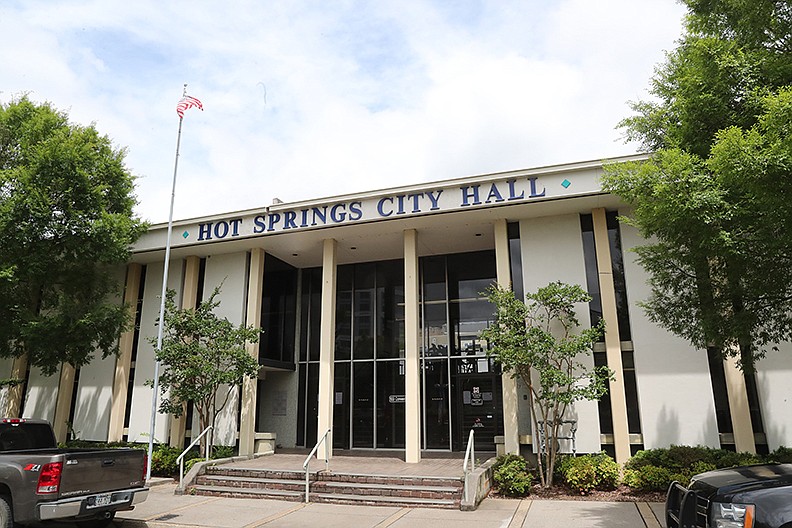The growing number of visitors staying in residential areas has highlighted tensions between the city's residents and its tourism-based economy.
The Hot Springs Board of Directors and city staff have waded into the controversy, working to develop a regulatory scheme that balances the concerns of residents who have said their neighborhoods have been overrun by short-term rentals with the need to accommodate an industry that accounts for an ever-growing share of the area's lodging portfolio.
People on both sides of the issue weighed in at the listening session the city hosted Tuesday night. City Manager Bill Burrough said their input will be considered as the city works to enshrine regulations before the moratorium on business licenses for short-term rentals the board imposed earlier this month takes effect May 30.
"This is an item that has risen to the highest priority we have," he told the group who gathered at Horner Hall in the Hot Springs Convention Center. "I want to thank the board for taking up this challenge. The easiest thing for us to do is ignore it, but that's not what we do. We're not afraid of challenges. We're not afraid to take up the tough issues and find that mediation that needs to happen to come up with a solution that works for all parties."
Visit Hot Springs CEO Steve Arrison said more than 1,000 short-term rentals are in Garland County. Websites that connect hosts to visitors show listings that run the gamut from opulent lake homes that rent for $700 a night to more modest homes in the Park and Whittington area that go for less than $150 a night.
Visit Hot Springs' accounting department said 174 short-term rental businesses in the city have registered with the tourism authority, but Arrison said many more operate under the radar.
"We require short-term rentals that are in the city limits to register with us and file a report. There's so many of them it's difficult to track them down. We bought software that helps us try and track those down, so we know who they are," he said.
"It's a big issue. I'm very happy that the city is tackling it and is going to come up with some regulations."
Arrison said Airbnb is the only online platform that collects and remits city and county sales taxes and the 3% sales tax the Hot Springs Advertising and Promotion Commission levies on prepared food and lodging inside the city. Other online marketplaces rely on hosts to collect sales taxes.
"It's really not about the money," Arrison said. "We need to know where they are and make sure they're safe. Short-term rentals are a great business. I do not want to see them go away from Hot Springs, however, we need to make sure the people who stay in them are safe.
"They're competing with hotels that pay taxes and have insurance to protect their guests. It needs to be a level playing field. They're a great asset to our community. I can't speak for the city, but nobody wants to kill the short-term rental industry."
Several people who spoke Tuesday night said short-term rentals have upset the peace and quiet of their neighborhoods. Some hosts are allowing dozens of guests to stay in homes built for small families, they said, creating large amounts of trash, cluttering public rights of way with vehicles that block emergency vehicle traffic and generating noise complaints.
Don Leonard said he lives next to a home listed on Airbnb. As many as 30 people have stayed in the 3,000-square-foot space, he said, straining the grinder sewer pump his home shares with the property.
"That system can't handle 30 people," he said.
Others said competition for guests in the online marketplace requires investments owners of long-term rentals aren't willing to make. Those investment dollars have revitalized uptown neighborhoods in the Park and Whittington area, they said.
"The short-term rental space is competitive," short-term rental owner Chris Post said. "Your pictures need to pop. If there's something wrong with them, that guest is going to go to the next house. We spend a lot of money on these houses. We take a lot of pride in these houses to keep them nice, to keep them looking great."
In addition to imposing a more than four-month moratorium on business licenses for short-term rentals, effective May 30, the ordinance the board adopted at its March 2 meeting established an annual tax of $50 per bed for short-term rentals.
Hotels pay a $4 per bed tax, according to the business license and occupation tax schedule in the city code. Several people said the city should use business license and sales tax revenue generated by short-term rentals to strengthen code enforcement.
"More lawyers, more enforcers, whatever you need to do to take care of these dilapidated houses around town," real estate agent John Cooksey said. "The city doesn't have enough staff to take care of what's going on. We have very good code people, but they're overworked. Let's take that money and invest in the manpower to make this town a better place."
